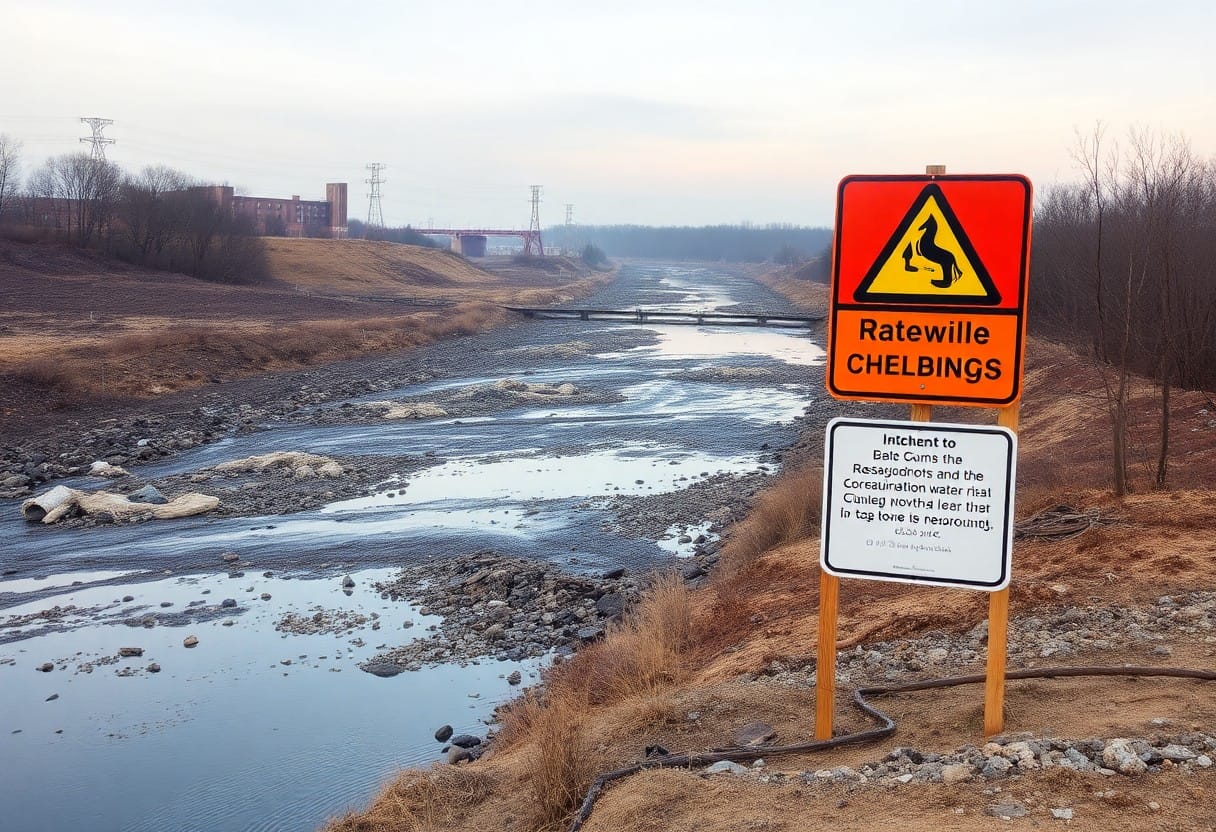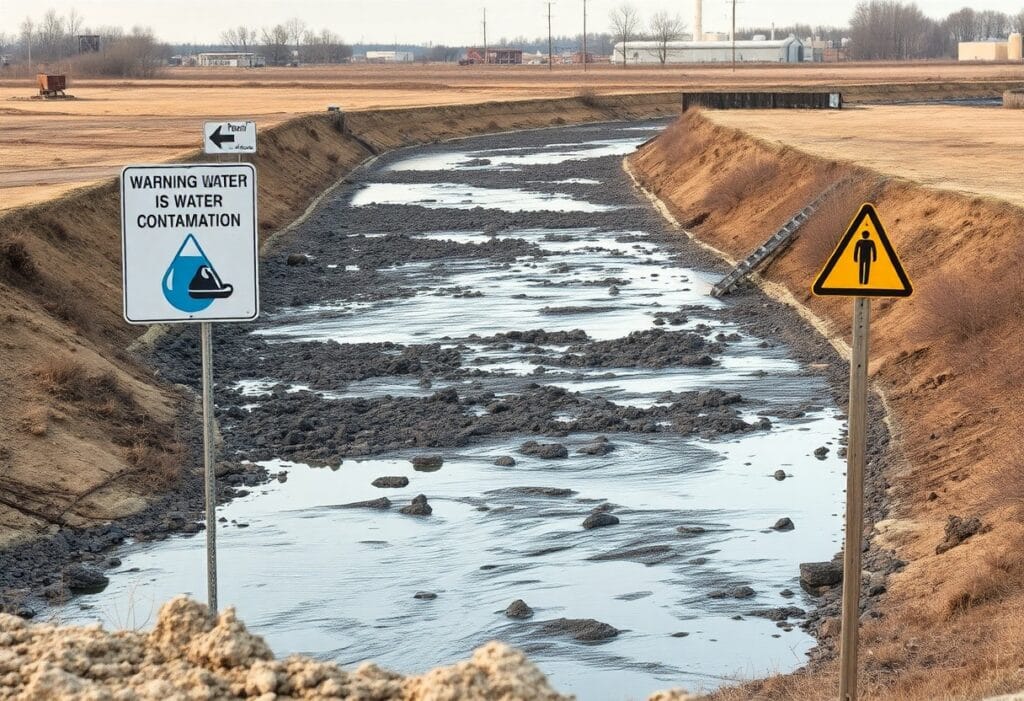Most people are unaware of the profound effects that Chemours has had on Fayetteville’s waterways. As a company producing a range of chemicals, it has left behind a concerning legacy of pollutants in your local environment, which poses risks to both public health and wildlife. Rising levels of per- and polyfluoroalkyl substances (PFAS) have drawn attention to the urgent need for awareness and action. In this post, you’ll learn about the extent of the contamination and what it means for your community and future.

Overview of Chemours and its Operations
To understand the scope of Chemours’ impact on Fayetteville’s waterways, it’s necessary to examine the company’s operations and chemical production processes. As a leading global chemical producer, Chemours specializes in manufacturing a wide range of fluorinated chemicals, including those used in various industrial applications, agriculture, and consumer products. Your awareness of these operations is vital, as they contribute significantly to the local ecology and public health.
Company History
Chemours was established in 2015 as a spin-off from DuPont, with the intention of focusing on high-performance materials and chemicals. With a legacy tied to the production of fluoropolymers and other highly engineered substances, Chemours has faced scrutiny over its environmental practices and the persistent chemicals it has released into surrounding ecosystems. Understanding this history helps you appreciate the long-term implications of the company’s operations on the community and environment.
Chemical Production Processes
For you to grasp the potential risks associated with Chemours’ practices, it is important to explore into the company’s chemical production processes. These processes employ various hazardous materials and produce per- and polyfluoroalkyl substances (PFAS), known for their persistence in the environment and serious health implications. This insight allows you to evaluate the broader effects of industrial activities on your local waterways.
Company operations at Chemours involve complex chemical processes that can lead to the release of toxic compounds, including PFAS, into the environment. These chemicals are used in products ranging from non-stick cookware to water-repellent fabrics, but their positive applications come at a cost. The production often results in industrial waste that can contaminate air, soil, and surface water, affecting not just the ecological balance but also your own health and wellbeing. Awareness of these processes empowers you to advocate for better practices and accountability from companies operating in your area.
Understanding PFAS
Now that awareness of PFAS has increased, it’s vital to comprehend the implications these substances have on human health and environmental safety. As you investigate deeper into their effects, you’ll see how these “forever chemicals” are persistent in nature, leading to long-lasting contamination of water systems, particularly in Fayetteville.
Definition and Chemical Properties
Properties of PFAS include their unique chemical structure, characterized by a chain of carbon atoms bonded to fluorine atoms. This arrangement provides them with high resistance to heat, water, and oil, which makes them appealing for various industrial applications. However, this stability also results in their inability to break down in the environment, leading to their accumulation in ecosystems.
Sources and Environmental Impact
Across various sectors, PFAS originate from numerous sources including industrial discharges, consumer products, and wastewater treatment facilities. These sources contribute to the widespread contamination of water bodies, exposing communities to potential health risks.
But as you consider the sources and environmental impact, it’s critical to note that many everyday items, such as non-stick cookware, stain-resistant fabrics, and firefighting foam, contain PFAS. When these products are used or discarded, they can leach into your local waterways, causing a widespread and concerning environmental issue. The persistence of PFAS compounds in soil and water can disrupt ecosystems, impacting both wildlife and human populations. Addressing this contamination is necessary for restoring the safety of your drinking water and safeguarding your health.
The Fayetteville Area’s Waterways
The Fayetteville area is characterized by a network of rivers, streams, and ponds that provide imperative resources for the community, including recreation and wildlife habitats. These waterways, such as the Cape Fear River and the numerous tributaries, play a significant role in the local ecosystem. However, they also bear the weight of industrial contamination and pollution, making them vital areas of concern for residents and environmental activists alike.
Geographic Overview
Waterways in the Fayetteville region flow through a diverse landscape, with rolling hills and fertile plains that contribute to both agricultural and urban areas. This unique geography allows for a variety of aquatic habitats, supporting local flora and fauna. However, the proximity of manufacturing facilities, particularly those operated by Chemours, has introduced a range of pollutants into these imperative waterways, raising significant environmental and health concerns.
Historical Context of Water Quality
About thirty years ago, the state initiated monitoring programs to assess water quality in the Fayetteville area. While the focus was on maintaining healthy ecosystems, it quickly became evident that toxic substances from local industries, especially *PFAS compounds*, posed serious risks. Industrial discharge has left lasting contaminants in both surface and groundwater sources, affecting drinking water safety for many residents and threatening aquatic life.
This ongoing contamination story is alarming for anyone living in the area. The legacy of manufacturing pollutants like per- and polyfluoroalkyl substances (PFAS) has become a pressing issue, as you may be consuming water that has not met safe health standards. In light of this, you might find it important to stay informed about local water reports and advocate for stricter regulations to ensure safe and clean waterways for your community and future generations.
Contamination Incidents
Unlike many corporations, Chemours has a notorious history of pollution incidents in Fayetteville, leaving your local waterways vulnerable to toxic contamination. These events not only raise public health concerns but also cast a shadow over the community’s perception of environmental safety.
Notable Spills and Emissions
Above all, several significant spills and emissions from Chemours have been recorded, highlighting the company’s struggle with managing their operations responsibly. Each incident has added to the growing concern among residents about the long-term effects on your environment.
Impact on Local Ecosystems
By experiencing ongoing contamination, local ecosystems suffer detrimental effects that reverberate throughout the community. Waterways become polluted, disrupting wildlife and affecting your recreational spaces.
In fact, the persistent toxin levels not only harm aquatic life but also allow hazardous substances to bioaccumulate in fish and other wildlife, threatening their survival and the safety of your local food chain. These contaminants, including per- and polyfluoroalkyl substances (PFAS), have been linked to various health issues, impacting both the environment and your well-being. The health of sensitive species, such as amphibians and fish, is directly jeopardized, serving as a critical reminder of the dangers posed to your local ecosystem.
Health Risks Associated with PFAS
Many studies reveal alarming health risks linked to PFAS exposure, particularly from Chemours in Fayetteville. You can read more about how these hazardous chemicals affect residents in the GenX study finds Chemours-specific chemicals in residents. Potential health issues range from hormonal disruptions to increased risk of certain cancers, emphasizing the need for awareness and action against these toxic substances.
Human Health Implications
Below the surface, PFAS chemicals can lead to significant health implications. Chronic exposure may result in conditions such as liver damage, thyroid disease, and reproductive issues, which can detrimentally affect your overall well-being. Awareness of these consequences encourages you to seek more information and advocate for clean water access.
Vulnerable Populations
Risks associated with PFAS exposure are especially pronounced for vulnerable populations, including children and pregnant women. These groups may experience heightened sensitivity to the harmful effects of these chemicals, which can lead to long-term developmental and health issues. Therefore, safeguarding the health of these populations is of utmost importance.
To protect vulnerable populations, it is necessary to implement effective measures that prevent exposure to PFAS. Children’s developing immune systems and pregnant women’s health are particularly at risk, making it vital for you to advocate for stringent regulations on chemical discharges and water safety standards. By understanding and addressing these risks, you can contribute to a community effort that prioritizes health and well-being.
Responses and Remediation Efforts
For many residents, the contamination of Fayetteville’s waterways has sparked significant concern and action. Efforts are underway to address the pollution, with Cape Fear River basin contaminated with more toxic chemicals than previously understood. Both local and federal agencies are collaborating on various remediation strategies to mitigate the impact of Chemours’ toxic legacy on the environment and public health.
Government and Regulatory Actions
Between legislative measures and environmental regulations, government entities are stepping up to tackle the water contamination crisis. Initiatives include stricter guidelines for chemical discharges, regular monitoring of local waterways, and potential funding for cleanup operations. These actions aim to hold polluters accountable and ensure safer water for all residents.
Community Advocacy and Initiatives
Actions taken by community members have played a vital role in raising awareness about water safety and advocating for change. Local organizations are mobilizing efforts to educate the public on the dangers of chemical contamination and pushing for stronger protective measures. Through grassroots campaigns and public forums, residents like you can contribute to a collective voice that demands accountability and promotes environmental justice.
To foster a cleaner future, various grassroots initiatives are working hard to mobilize community support. Local activists are uniting to advocate for stricter environmental policies and engage residents in conversations about water safety. Their efforts emphasize the need for transparency from chemical companies and demand immediate action to safeguard your health. By participating in these initiatives, you can make a tangible impact on addressing contamination issues and advocating for long-term solutions.
Final Words
To wrap up, it is vital for you to understand the grave implications of Chemours’ toxic legacy on Fayetteville’s waterways. The contamination poses significant health risks to your community, affecting both water quality and ecosystem vitality. Staying informed and advocating for accountability is your responsibility in addressing this pressing issue. As you engage with local initiatives and demand cleaner practices, you contribute to protecting your environment and ensuring safer water for future generations.


















